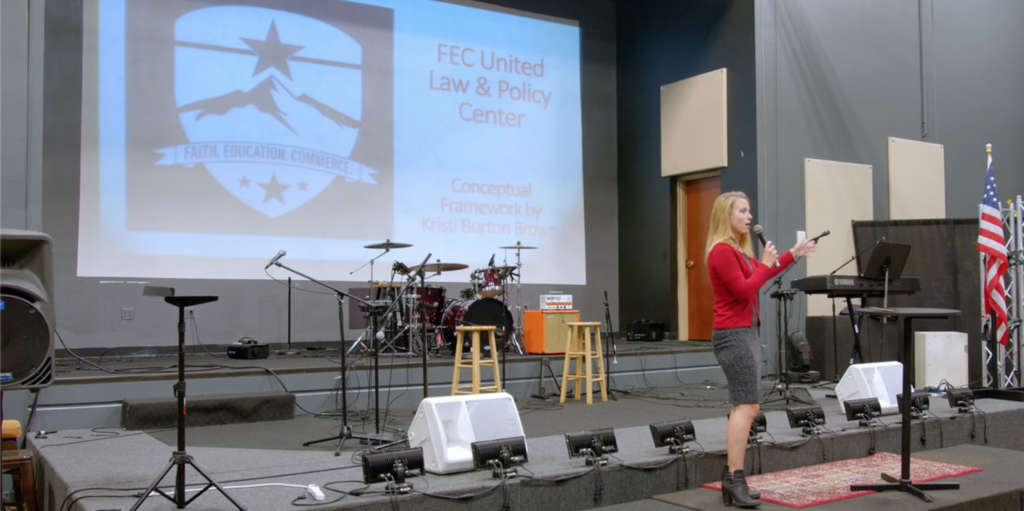Are two top Colorado Republicans moving on from party politics?
The conclusion of the 2020 election portends shifts in power for Colorado Republicans within the statehouse but also beyond the dome. As conservatives grapple with dwindling numbers of elected office-holders, behind-the-scenes donors, consultants, and power brokers are maneuvering for leverage not only at the legislature but at all levels of government.
However, much like Trump’s victory scrambled the traditional Republican power structure at the federal level, Patrick Neville’s ascendency to House Minority Leader upended the conservative infrastructure as the previously fringe state representative suddenly seized the party’s purse strings.
A similar upheaval took place within the state party leadership last year, when Ken Buck, the self-described “most conservative member of Congress,” joined forces with Neville ally and far-right evangelical Kristi Burton Brown to become Chair and Vice-Chair of the Colorado GOP. That election result was even more confusing as the Buck-Brown ticket was considered the “establishment” choice in contrast to the runner-up, state Rep. Susan Beckman of Littleton.
Among conservatives, the tension between the far-right and the more moderate wings of the party is also nothing new. Ten years ago it was the “Tea Party” vs. the establishment; now it’s the “Liberty” wing vs. Republicans In Name Only (RINOs).
Two prominent GOP officials’ recent statements hint at changes to come in Colorado’s conservative power structure.
First, Neville says he’s stepping down from his caucus leadership role to concentrate on building a statewide grassroots organization.
Second, Colorado Republican Party Vice Chair Kristi Burton Brown has spent considerable time in recent months working closely with another outside group, FEC United, which has national aspirations. She’s helping it launch a Law & Policy Center which has as its first project suing the Colorado Times Recorder and other Colorado media outlets.
Both Neville and Burton Brown rose to power from the far-right wing of Colorado conservative issue politics, Burton Brown from the anti-choice Personhood campaigns, and Neville from the gun rights activism of Dudley Brown’s Rocky Mountain Gun Owners.
There is evidence that Neville’s decision to step away from his top caucus position wasn’t entirely voluntary. Speculation of a leadership challenge began almost immediately after his preferred candidates suffered resounding losses in this summer’s primary election. At the time, however, Neville said he announced his intention not to run again for the good of the party, in hope that Republicans who were “trying to sabotage him” would switch focus back to trying to win seats from Democrats.
Regardless of whether he’s jumping or being pushed out, Neville’s announcement means he’ll no longer have control of the GOP House caucus fund Values First Colorado, which traditionally receives the large corporate checks that Colorado law prevents donors from giving directly to political parties. In the past five months alone, the Minority Leader has directed nearly a half-million dollars of Republican money to his brother’s consulting firm, Rearden Strategic. Almost all of that money made another stop along the way, moving from Values First Colorado to Neville’s other independent expenditure committee, Take Back Colorado.
Without Patrick directing statehouse GOP caucus funds to brother Joe’s consulting firm, can statehouse Democrats (and moderate Republicans facing primary challenges) expect a reprieve from the Nevilles’ hard-hitting and sometimes controversial attack ads of previous elections? Apparently not, as Patrick recently explained to conservatives podcast host Chuck Bonniwell & Julie Hayden.
Asked about a recent attack ad the Nevilles ran against state Rep. Brianna Titone that drew broad bipartisan criticism as transphobic, Patrick complained about having to endure criticism from establishment figures as a member of leadership.
“It’s a problem,” said Patrick Neville. “We run something like that and actually do a decent hit piece and there’s different consultants who come out of the woodwork and criticize your work because they’re trying to go after that leadership pot of money and I’m just over dealing with that. It’s more bureaucratic weight than it’s really worth.”

The Nevilles didn’t just attack Titone directly, they also funded robocalls and another anti-LGBT mailer that was sent by Rep. Stephen Humphrey’s PAC, Colorado Family Values Victory Fund. While CFVVF was responsible for the attack, the money behind it (deposited the same day the ad was paid for) came from the Neville’s Take Back Colorado. Nearly all of TBC’s money comes from Values First Colorado, aka that “leadership pot of money” that Neville complains all the consultants are after. VFC’s donors include dozens of large corporations and professionals associations. In September and early October VFC cashed checks from the Colorado Bankers Association PAC, Davita, Inc., Johnson & Johnson and cable giant Charter Communications.
In 2019, the Colorado Times Recorder reported on Values First Colorado’s decision to spend its corporate donors money on failed efforts to recall statehouse Democrats who had defeated VFC-supported Republicans in the previous election. VFC followed those unsuccessful recalls with an equally futile attempt to recall Governor Jared Polis.
Asked by Chuck Bonniwell if election day results would incur any “soul-searching” on the part of establishment Republicans, Neville said no. He went to claim that the mainstream party leaders, won’t be forced into such self-reflection until he’s “built up the grassroots organization and made it as effective and mighty as the establishment.”
Neville isn’t the only one with grand plans for building grassroots conservative power. Colorado GOP Vice Chair Kristi Burton Brown appears to be focusing her efforts outside of the party she helps lead. Taking her own statements about the project at face value, it seems like a lot of work, much of which could compete with the traditional duties of a political party leader.

Brown has been pitching FEC United in a presentation titled “FEC United Law & Policy Center Conceptual Framework.” Beginning with Colorado, Brown envisions building a national conservative political and policy powerhouse funded by millions of dues-paying members across the nation. Here’s part of her pitch to members in Colorado Springs early last month:
“We can launch probably in January to make sure we can operate and attract people around the nation. You could do an individual membership. You guys know about the ACLU, right? What the ACLU has successfully done is build a membership model… We also need a membership organization, very cheap to join — $25 a year, $5 a month, something like that- – and you become a card-carrying member of FEC United and you are part of the organization that actually stands up for the rights of Americans. And then let’s also have business memberships. We will convince businesses around America that we stand up for their rights…. So we have to build a model that’s operational, that pays for itself to do these good things at a very low cost to people who want to get involved and to dedicate their time to act and to make good things happen. So, thank you for listening to my presentation of the Law and Policy Center that we can start at FEC United.”
It’s unclear whether either of these projects will get off the ground. FEC United is clearly further along, with its robust social media network and having already hosted numerous in-person events up and down the Front Range. Founder Joe Oltmann claims to have nearly 90,000 members already on board, and as well talks with people in eight other states interested in signing “charters.” Neville’s Take Back Colorado is presumably just an email list and a brand at this point, but between his considerable personal experience and familiy connections with RMGO, right-wing media and other far-right groups in Colorado, there’s certainly potential for growth. Whatever happens it doesn’t look the longstanding divide between moderate and ultra-conservative Republicans will be bridged anytime soon.




